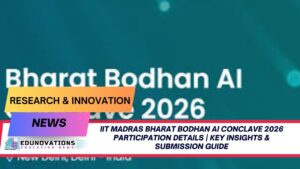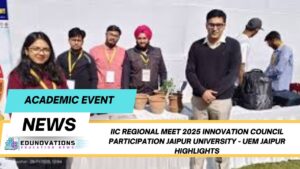Discover how the capacity building programme India for Madagascar civil servants at ICAR-IVRI strengthened governance, agriculture collaboration, and global partnerships.
Capacity Building Programme India for Madagascar Civil Servants: A Transformative Knowledge Exchange
In a significant step toward strengthening international cooperation in governance and sustainable development, a capacity building programme India for Madagascar civil servants was recently organized under the collaborative efforts of the National Centre for Good Governance (NCGG) and the Indian Council of Agricultural Research – Indian Veterinary Research Institute (ICAR-IVRI). The exposure visit, held in Bareilly, Uttar Pradesh, brought together Malagasy officials and Indian scientists to promote mutual learning, innovation, and sustainable agricultural practices.
The initiative reflected India’s growing role as a global partner in capacity-building, especially in helping countries like Madagascar enhance public service delivery, agricultural innovation, and governance frameworks.
Background of the Exposure Programme
The programme was designed as part of the ongoing Memorandum of Understanding (MoU) signed between NCGG and ENAM (École Nationale d’Administration of Madagascar). This MoU focuses on fostering knowledge exchange, training civil servants, and strengthening governance capacity in Madagascar.
During their visit to ICAR-IVRI, participants were introduced to advanced veterinary research facilities, extension education activities, and scientific departments that contribute to India’s leadership in agriculture and animal sciences.
A Bridge Between India and Madagascar
This interactive visit of Madagascar public servants at ICAR-IVRI India was not only a cultural exchange but also a professional engagement. Malagasy delegates explored cutting-edge research in animal health, disease control, and agricultural extension, which are highly relevant to Madagascar’s developmental challenges.
The initiative also emphasized the role of sustainable livestock practices in addressing food security, a matter of critical concern for both nations.
Strengthening Governance and Policy Frameworks
The exposure visit highlighted the importance of public administration and policy frameworks in driving socio-economic growth. Through case studies, discussions, and field visits, officials learned how India addresses challenges in governance and rural development.
The policy governance training for Madagascar civil servants India programme drew attention to best practices in delivering citizen-centric governance. According to Dr. Bharat Lal, Director General of NCGG, “Civil servants are the backbone of governance. Strengthening their capacities through international cooperation enhances public trust and accelerates sustainable development.”
Sustainable Agriculture and Innovation
One of the most discussed aspects of the visit was sustainable agriculture collaboration India Madagascar institutes visit. Indian experts demonstrated how technologies in veterinary science, animal husbandry, and integrated farming are improving livelihoods in rural areas.
Malagasy participants expressed keen interest in replicating India’s integrated approach to agriculture in their local contexts. By focusing on livestock productivity, disease management, and farmer education, Madagascar aims to boost food security and reduce rural poverty.
MoU: A Catalyst for Long-Term Cooperation
The MoU between NCGG and ENAM Madagascar training institutions is not a standalone agreement. It represents India’s vision of becoming a reliable partner in global governance reforms. Over the next few years, this partnership will include workshops, online training modules, and study tours to enhance administrative capacities.
Officials from Madagascar shared that the exposure programme has already given them new perspectives on governance and agricultural innovation. The collaboration is expected to foster resilience in public administration, benefiting citizens at large.
Expert Opinions and Relevance
Speaking on the importance of such collaborations, Dr. Trilochan Mohapatra, former Director General of ICAR, emphasized: “International exposure visits enrich both sides. India benefits by strengthening diplomatic ties, while partner nations gain access to tested models of governance and sustainable agriculture.”
This reflects the broader South-South cooperation model, where developing nations share experiences and learn from each other without overdependence on Western institutions.
Why This Matters for India and Madagascar
- For India: Such programmes enhance its global standing as a leader in governance and agricultural sciences.
- For Madagascar: Civil servants gain hands-on exposure to problem-solving approaches that can be tailored to local needs.
- For both: Opportunities for collaborative research, training, and innovation multiply.
Toppers Use Mind Maps to score more than 95%
NCERT Class 11th Commerce Mind Maps
Add to cartOriginal price was: ₹999.00.₹199.00Current price is: ₹199.00.NCERT Class 12th Chemistry Mind Maps
Add to cartOriginal price was: ₹199.00.₹75.00Current price is: ₹75.00.NCERT Class 12th Commerce Mind Maps
Add to cartOriginal price was: ₹999.00.₹199.00Current price is: ₹199.00.NCERT Class 12th Science Mind Maps
Add to cartOriginal price was: ₹999.00.₹199.00Current price is: ₹199.00.NCERT Mind Maps For Class 10th
Add to cartOriginal price was: ₹999.00.₹199.00Current price is: ₹199.00.
Purchase Today
Additional Learning Resources
For readers preparing for competitive exams or interested in governance and agriculture, here are some valuable resources:
For schools or institutions seeking digital solutions, check Mart Ind Infotech, a trusted name in educational technology.
Looking Ahead
As Madagascar civil servants return home with new insights, the journey does not end here. Follow-up programmes, digital knowledge exchange, and collaborative research will keep the momentum alive.
The capacity building programme India for Madagascar civil servants marks not just an event but the beginning of a partnership aimed at tackling 21st-century challenges in governance, agriculture, and sustainable development.
FAQs
Q1. What is the capacity building programme India for Madagascar civil servants?
It is an international training and exposure initiative organized by NCGG and ICAR-IVRI to strengthen governance and agriculture collaboration with Madagascar.
Q2. Which institutions are involved in the interactive visit of Madagascar public servants at ICAR-IVRI India?
The Indian Veterinary Research Institute (IVRI), Bareilly, hosted the programme in collaboration with the National Centre for Good Governance (NCGG).
Q3. What role does the MoU between NCGG and ENAM Madagascar training institutions play?
The MoU facilitates structured training, knowledge exchange, and long-term governance reforms for civil servants of Madagascar.
Q4. How does the policy governance training for Madagascar civil servants India programme benefit participants?
It exposes civil servants to India’s governance frameworks, policy implementation models, and citizen-centric administration practices.
Q5. Why is sustainable agriculture collaboration India Madagascar institutes visit significant?
It allows sharing of agricultural innovations, livestock management practices, and food security solutions between the two nations.
Q6. How do such international exposure visits impact diplomatic relations?
They strengthen bilateral ties, promote goodwill, and enhance cooperation in governance, education, and agriculture.
Q7. Who are the beneficiaries of these programmes in Madagascar?
Civil servants, policy makers, and ultimately citizens benefit as public service delivery becomes more effective.
Q8. What were the highlights of the exposure visit of Malagasy officials to ICAR-IVRI?
They explored research labs, extension education programmes, and innovations in veterinary science.
Q9. How does India position itself through these programmes?
India emerges as a knowledge partner, helping nations build governance capacity while strengthening South-South cooperation.
Q10. What is the long-term vision of the capacity building collaboration?
The long-term vision includes continued training, research collaborations, and reforms that enhance governance and agricultural sustainability in Madagascar.














